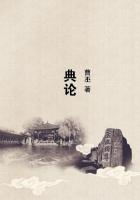`Very well,' said Troy, impatiently. `Let's see what you have.'
`The best I have in stock is this one,' said the stone-cutter, going into a shed. `Here's a marble headstone beautifully crocketed; with medallions beneath of typical subjects; here's the footstone after the same pattern, and here's the coping to enclose the grave. The polishing alone of the set cost me eleven pounds - the slabs are the best of their kind, and I can warrant them to resist rain and frost for a hundred years without flying.'
`And how much?'
`Well, I could add the name, and put it up at Weatherbury for the sum you mention.'
`Get it done to-day, and I'll pay the money now.'
The man agreed, and wondered at such a mood in a visitor who wore not a shred of mourning. Troy then wrote the words which were to form the inscription, settled the account and went away. In the afternoon he came back again, and found that the lettering was almost done. He waited in the yard till the tomb was packed, and saw it placed in the cart and starting on its way to Weatherbury, giving directions to the two men who were to accompany it to inquire of the sexton for the grave of the person named in the inscription.
It was quite dark when Troy came out of Casterbridge. He carried rather a heavy basket upon his arm, with which he strode moodily along the road, resting occasionally at bridges and gates, whereon he deposited his burden for a time. Midway on his journey he met, returning in the darkness, the men and the waggon which had conveyed the tomb. He merely inquired if the work was done, and, on being assured that it was, passed on again.
Troy entered Weatherbury churchyard about ten o'clock, and went Immediately to the corner where he had marked the vacant grave early in the morning.
It was on the obscure side of the tower, screened to a great extent from the view of passers along the road - a spot which until lately had been abandoned to heaps of stones and bushes of alder, but now it was cleared and made orderly for interments, by reason of the rapid filling of the ground elsewhere.
Here now stood the tomb as the men had stated, snow-white and shapely in the gloom, consisting of head and foot stone, and enclosing border of marble-work uniting them. In the midst was mould, suitable for plants.
Troy deposited his basket beside the tomb, and vanished for a few minutes.
When he returned he carried a spade and a lantern, the light of which he directed for a few moments upon the marble whilst he read the inscription.
He hung his lantern on the lowest bough of the yew-tree, and took from his basket flower-roots of several varieties. There were bundles of snowdrop, hyacinth and crocus bulbs, violets and double daisies, which were to bloom in early spring, and of carnations, pinks, picotees; lilies-of the valley, forget-me-not, summer's farewell; meadow-saffron and others, for the later seasons of the year.
Troy laid these out upon the grass, and with an impassive face set to work to plant them. The snowdrops were arranged in a line on the outside of the coping, the remainder within the enclosure of the grave. The crocuses and hyacinths were to grow in rows; some of the summer flowers he placed over her head and feet, the lilies and forget-me-nots over her heart. The remainder were dispersed in the spaces between these.
Troy, in his prostration at this time, had no perception that in the futility of these romantic doings, dictated by a remorseful reaction from previous indifference, there was any element of absurdity. Deriving his idiosyncrasies from both sides of the Channel, he showed at such junctures as the present the inelasticity of the Englishman, together with that blindness to the line where sentiment verges on mawkishness, characteristic of the French.
It was a cloudy, muggy, and very dark night, and the rays from Troy's lantern spread into the two old yews with a strange illuminating power, flickering, as it seemed, up to the black ceiling of cloud above. He felt a large drop of rain upon the back of his hand, and presently one came and entered one of the holes of the lantern, whereupon the candle sputtered and went out. Troy was weary, and it being now not far from midnight, and the rain threatening to increase, he resolved to leave the finishing touches of his labour until the day should break. He groped along the wall and over the graves in the dark till he found himself round at the north side.
Here he entered the porch, and, reclining upon the bench within, fell asleep.













